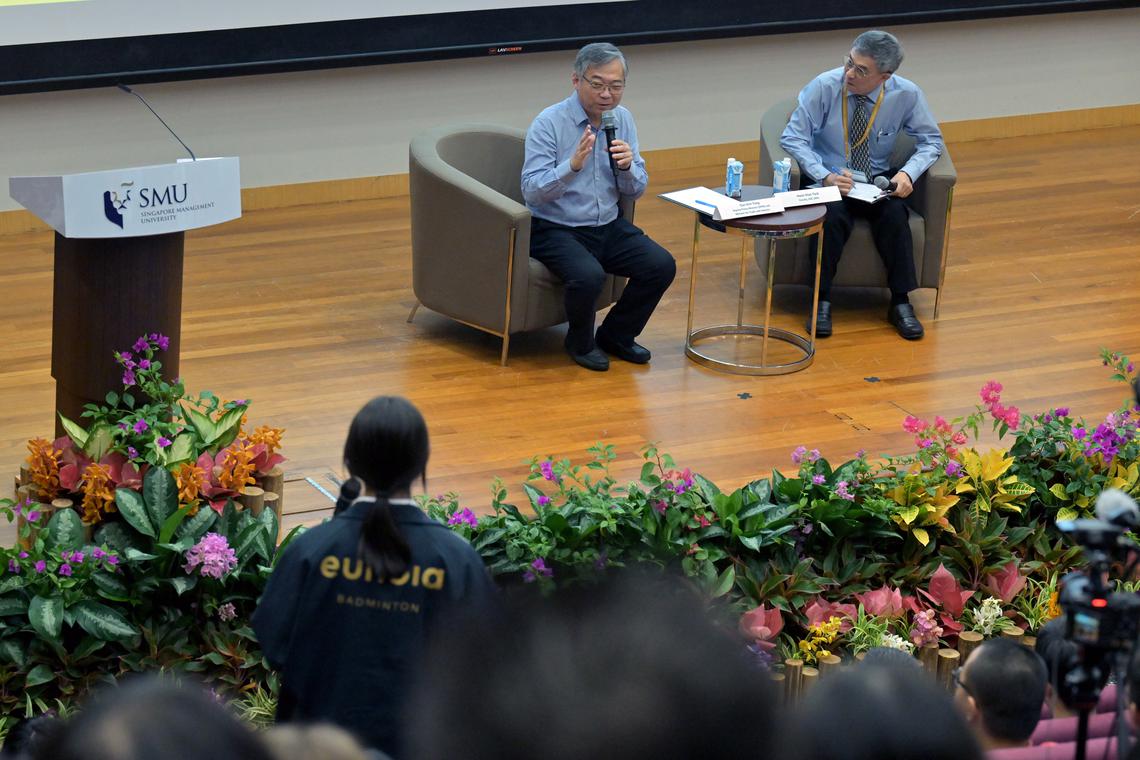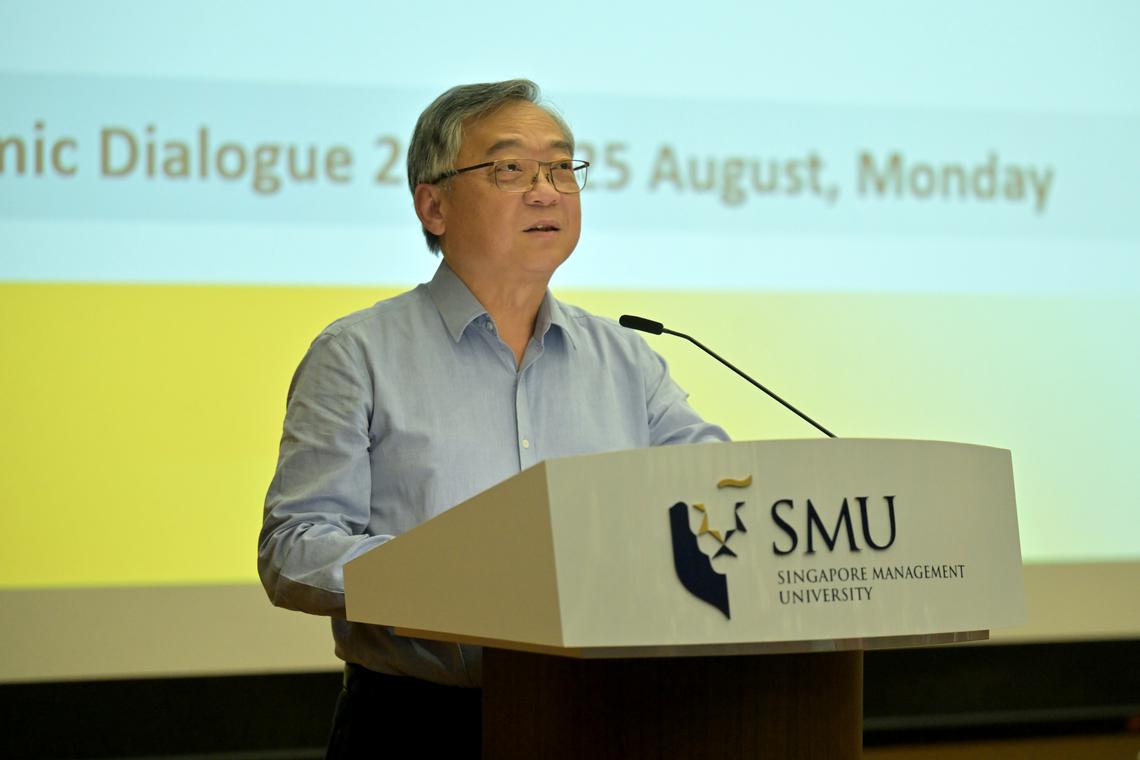SINGAPORE – Singapore should be ready for
more tariff-induced uncertainties
and structural shifts in the global economy that can affect trade and investment flows, said Deputy Prime Minister Gan Kim Yong.
The Republic needs to position itself well for a new global economic landscape, even as the top priority is to manage the immediate tariff-related uncertainties, he said.
DPM Gan was speaking on Aug 25 at the annual MTI Economic Dialogue, which is jointly organised by the Ministry of Trade and Industry and the local universities, and held at the Singapore Management University. The event, which started in 2008, acts as a platform for students to gain insights into pertinent economic issues and challenges facing Singapore, as well as the role of economics in policymaking.
DPM Gan, who is also the Minister for Trade and Industry, said that while the US has made deals with many of its key trading partners since April 2 – when President Donald Trump
unveiled his reciprocal tariff policy
– significant uncertainties remain.
“Details on how the deals will be implemented remain unclear, and in fact, we have already seen a number of conflicting interpretations emerge,” he said.
Negotiations with China, India and Switzerland are still ongoing, while the US has also hinted that further sectoral tariffs, such as on semiconductors and pharmaceuticals – key Singapore exports – are imminent.
DPM Gan said that as the effects of the tariffs flow through global supply chains, the costs are in time expected to exert margin and price pressures. “This will impact both consumer and corporate spending, and slow down growth in the global economy.”
He said there will be next-order effects of the tariffs to watch out for. “For example, if a country has now decided to buy more agricultural products such as rice and soya beans from the US, it may decide to buy less from its other trading partners,” he said.
Also, countries which have pledged new investment commitments in the US may decide to scale back their investments in other parts of the world.
Meanwhile, companies may also decide to diversify their markets and supply chains.
With a view to charting a way forward and navigating the near-term uncertainties, the
Singapore Economic Resilience Taskforce (SERT)
was formed earlier in 2025.
“Our focus at the start was to strengthen our collective sense-making of the tariff developments, as well as to help our businesses and workers manage the immediate impact of the US tariffs,” said DPM Gan.
SERT deliberations resulted in the introduction of the Business Adaptation Grant that will be rolled out in October to help businesses adjust to the new landscape.
Graduate Industry Traineeships programme
has also been announced to help fresh graduates gain industry-relevant experience and skills, which will facilitate their transition into full-time employment.
More recently, to position Singapore well for the new economic landscape, an
Economic Strategy Review (ESR) under SERT
was convened to develop a forward-looking economic blueprint for Singapore.
DPM Gan said the ESR will study how to navigate structural shifts, so that Singapore can continue to thrive and stay relevant. He said one such shift is in technology, such as artificial intelligence (AI), which when combined with automation and robotics, will reshape industries and jobs.
While companies must be encouraged to invest in practical AI use cases that help raise productivity, job roles that will be affected by AI must also be identified.
This will help target the upskilling and reskilling interventions required to enable workers to move into higher-value jobs enabled by AI. “We want to transform both enterprise and workforce transformation in a complementary way, so that AI becomes a tool for enhancement, and not displacement, of labour,” said DPM Gan.
renewing and refreshing its efforts at skills upgrading
, he noted.
He said: “Last year, we enhanced SkillsFuture with a Level-Up Programme, to encourage and support Singaporeans to undertake a significant skills reboot in the middle of their careers.
“By doing so, we want our people to be equipped with the skills to take advantage of the opportunities in new industries and new jobs in the future economy.”

DPM Gan Kim Yong said the Government has been renewing and refreshing its efforts at skills upgrading.
ST PHOTO: DESMOND FOO
The Government will also pay attention to segments which are at greater risk of being left behind, such as professional, manager and executive roles that may be replaced by AI, and rank-and-file workers in sectors that are undergoing restructuring.
“This is why we introduced the SkillsFuture Jobseeker Support Scheme earlier this year, to provide temporary financial support for individuals who may be involuntarily unemployed,” he said.
However, DPM Gan said, with greater volatility in the economic landscape ahead, the Government is studying the need for broader, system-level support to help such workers gain employment.
Still, he added, it is not all doom and gloom. “Singapore is in a strong position to find opportunities even in the midst of these challenges,” he said.
One reason for the optimism is the small size of the economy, which allows Singapore to adapt quickly to global changes, he said.
Another reason is that “we have built a very strong foundation over the last six decades”.
“We have one of the most efficient infrastructure – whether it’s our ports, our sea ports, our airports, our airlines – our connectivity is enormous. So I think this is one of the key strengths of Singapore. It’s not easy for other countries to replicate,” he said.

